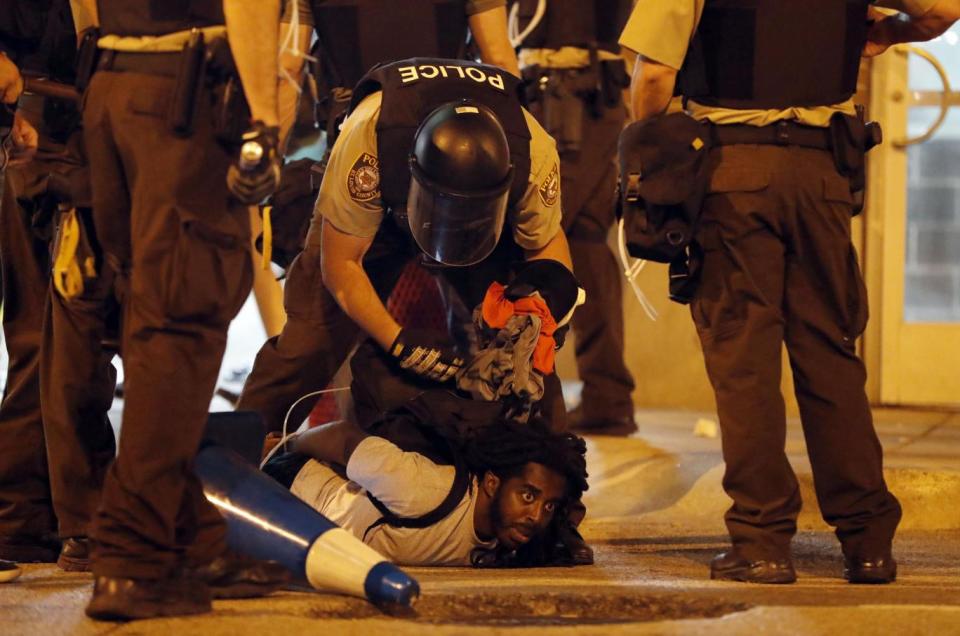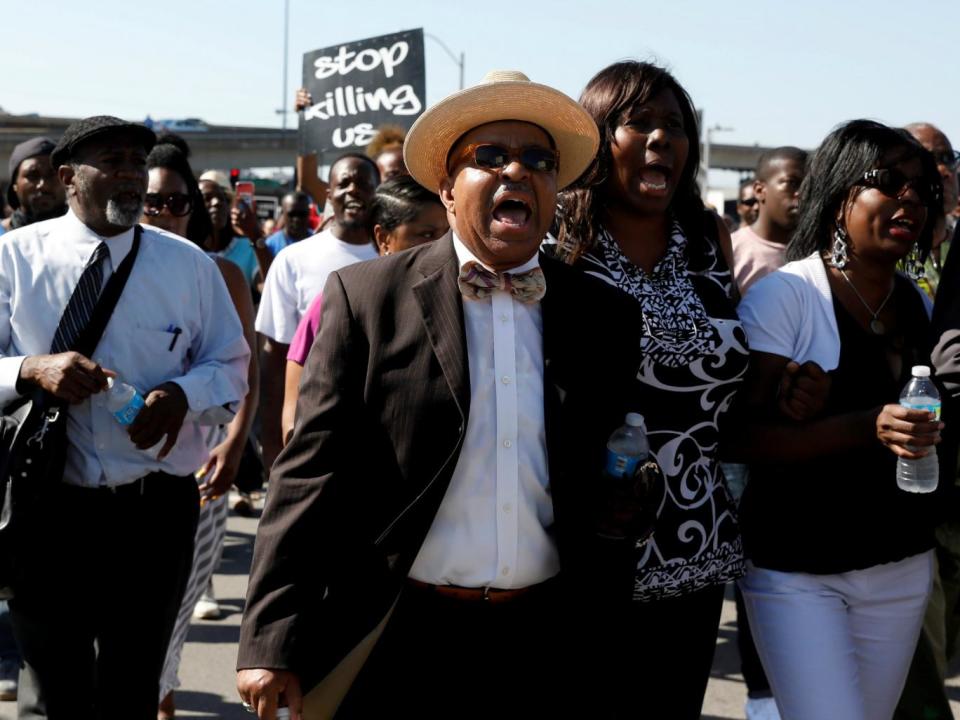St Louis protests: Journalists say they were beaten and arrested by police while covering demonstrations
Reporters say they were pepper sprayed, beaten, and arrested by St Louis police while covering protests in the midwestern city.
Police arrested more than 200 people over the weekend, as protesters took to the streets to decry the acquittal of former St Louis police officer Jason Stockley in the fatal shooting of a young black man. Among those arrested were newspaper reporters, documentary makers, and livestream journalists who say they were just trying to do their jobs.
Jon Ziegler, a journalist who livestreams under the name “Rebelutionary Z”, described arriving at a largely peaceful protest on Sunday night. By that time, he said, "most of the casual protesters and onlookers were just hanging around".
Authorities say most of the protesters were peaceful, but some groups branched off and began destroying property.
The group wandered through downtown, passing shops and restaurants littered with patrons. Suddenly, Mr Ziegler said, they noticed they were surrounded on all sides. Lines of riot police were closing in, rhythmically banging the ground with sticks as they advanced.
Someone gave an order to disperse, Mr Ziegler recalled – but the protesters had nowhere to go.
In the journalist’s video from the night, someone can be heard yelling: “Where are we supposed to go?”

“I live down the street!” someone else yells. “They said I could walk down here!”
“We are closed in on all four sides now I have no idea where people are supposed to go," tweeted Mike Faulk, a reporter for the St Louis Post Dispatch was covering the protests. "People freaking out.”
The tactic appears similar to one called “kettling,” in which large numbers of police officers physically contain a crowd in a limited area. The practise is controversial because of the likelihood of catching innocent bystanders – journalists, legal observers, even passersby – in the “kettle”.
The police department did not directly respond to questions about kettling, but said the layout of the area, and not a specific tactic, dictated how tactics were deployed.
The clap clap of the batons on their armor. The SWAT cops are back. Marching both directions down Tucker squeezing us west on WA #STLVerdict
— Mike Faulk (@Mike_Faulk) September 18, 2017
Mr Ziegler said he assumed everyone on the street would be lined up and arrested. But once the police had fully encircled the group, he said, they instructed everyone all to get on the ground. Those who did not immediately comply – and even those who did, according to Mr Ziegler and others – were doused with pepper spray.
"Everyone got on the ground and put their arms up,” said Fareed Alston, a documentary filmmaker who was in St Louis to film the protests. “They still were kicking us, spraying us, and we were just on top of each other, soaking in a pile of pepper spray.”
Within minutes, Mr Alston said: “I couldn’t see anything; I couldn’t breathe; I was just burning from every place on my face, and even my hands and body.”
From there, Mr Alston said, the police demanded that everyone in the crowd stop filming, and snatched phones out of the hands of those who persisted. The filmmaker said his own camera was ripped off of his neck when he refused to turn it over.
Through eyes swollen with pepper spray, Mr Alston claims he saw police going through his photos. In a letter to the city, the St Louis Post Dispatch claims their reporter, Mr Faulk, had his phone searched through as well.
Armed with their large cameras and other equipment, the journalists said they were easily identifiable by police.
“Hey Superstar!” an officer can be heard yelling at Mr Ziegler in his video. Later, Mr Ziegler said, an officer joked about being his “biggest fan”.
“You wanted to take pictures, huh? You wanted to video record?" Mr Alston said police asked him, tauntingly.

The taunts signalled a change in the officers’ spirits, Mr Ziegler said. Once protesters had been subdued; pepper sprayed and zip-tied, "the mood changed completely, into a cop party".
Mr Zigler claimed – and Mr Alton independently confirmed – that officers started smoking cigars and taking selfies with arrestees. Later, other reporters would hear officers chanting, “Whose streets? Our streets!” as they marched through the city.
The police department said they have seen footage of the chanting, and were reviewing it.
"We hold our officers to the highest standards of professionalism and any officer not meeting those standards will be held accountable," a spokesman said.

Mr Ziegler, Mr Alton, and Mr Faulk were all taken to jail, and detained for anywhere from 12 to 24 hours. Both Mr Ziegler and Mr Faulk said they were denied medical attention. Mr Ziegler said he was never able to wash the pepper spray off his face; Mr Faulk, according to the letter sent by the Post Dispatch, returned to the newsroom “limping, knees bloodied and pepper spray still on his skin”. Mr Alton said he was never permitted to use a phone.
All three men were ultimately charged with failure to disperse, and released on bond. At a press conference, Police Chief Lawrence O’Toole repeatedly referred to those arrested as "criminals".
“I’m proud to tell you the city of St. Louis is safe and the police owned tonight,” he said on Sunday night. “Once again, a group of criminals set out to break windows and destroy property. Tonight, those criminals are in jail.”
The Post Dispatch has since launched a public campaign to demand the charges against Mr Faulk be dropped. In their letter, which they sent to the St Louis mayor, acting police chief, and city counselor, they deem Mr Faulk’s arrest “inappropriate and highly disturbing”.
In response, Mayor Lyda Krewson promised to have the Public Safety Department investigate the situation. The City Counselor, Julian Bush, called the allegations “disturbing,” and added: “We need to know more.”
But some feel the damage has already been done.
“The First Amendment is not a whimsical, academic concept to be dismissed when it becomes inconvenient — or embarrassing to the police,” Elizabeth Donald, president of the St. Louis Society of Professional Journalists, told the Post-Dispatch.
“The chilling effect of assaulting, arresting, jailing and charging a journalist in the course of his duties cannot be understated.”

 Yahoo News
Yahoo News 
